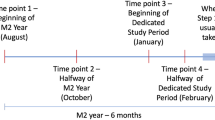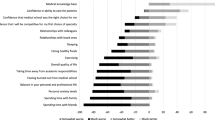Abstract
Purpose
This study examined medical students’ stress and certification exam preparation practices in a reformed clerkship curriculum that excluded high-stakes knowledge testing from end-of-rotation performance evaluation.
Method
Stress and exam preparation practices were assessed via a survey comprising locally developed questions, three subscales of the Motivated Strategies for Learning Questionnaire, and two subscales of the Medical Student Stressor Questionnaire. The association between stress, learning self-regulation, and certification exam scores was evaluated retrospectively using non-parametric tests of association (Spearman’s rho).
Results
Forty students responded to the survey and consented to use of academic performance data (57% participation rate). Mean certification exam scores were indistinguishable from historical controls. Exam preparation practices resembled those of pre-clinical students: exam-related worrying and time devoted to studying were high, increasing as the exam drew near; preferred study resources were directly analogous to exam questions; and study involved relatively few generative strategies (e.g., concept mapping). Sustaining effort and creating time and space to study were associated with better exam performance, as was participation in this study.
Discussion
On the surface, the absence of regularly spaced, high-stakes testing from clerkship performance evaluation appears to “do no harm” to students’ certification exam scores. Students already performing better academically may excel due in part to effective learning self-regulation strategies. However, a clerkship curriculum that does not scaffold self-regulation via cumulative knowledge assessment could further disadvantage students already earning lower scores. Evaluating the impact of curriculum reforms should continuously examine changes to learners’ experience in context.


Similar content being viewed by others
References
National Board of Medical Examiners. Characteristics of clinical clerkships. 2016. http://www.nbme.org/PDF/SubjectExams/Clerkship_Survey_Summary.pdf. Accessed 10 Jul 2018.
Ouyang W, Cuddy MM, Swanson DB. US medical student performance on the NBME subject examination in internal medicine: do clerkship sequence and length matter? J Gen Intern Med. 2015;30(9):1307–12.
Ryan MS, Bishop S, Browning J, Anand RJ, Waterhouse E, Rigby F, et al. Are scores from NBME subject examinations valid measures of knowledge acquired during clinical clerkships? Acad Med. 2017;92(6):847–52.
Kerdijk W, Cohen-Schotanus J, Mulder BF, Muntinghe FLH, Tio RA. Cumulative versus end-of-course assessment: effects on self-study time and test performance. Med Educ. 2015;49:709–16.
Deng F, Gluckstein JA, Larsen DP. Student-directed retrieval practice is a predictor of medical licensing examination performance. Perspect Med Educ. 2015;4:308–13.
Vora A, Maltezos N, Alfonzo L, Hernandez N, Calix E, Fernandez I. Predictors of scoring at least 600 on COMLEX-USA level 1: successful preparation strategies. J Am Osteopath Assoc. 2013;113:164.
Van der Vleuten CPM, Scherpbier AJJA, Dolmans DHJM, Schuwirth LWT, Verwijnen GM, Wolfhagen HAP. Clerkship assessment assessed. Med Teach. 2000;22:592–600.
Han H, Roberts NK, Korte R. Learning in the real place: medical students’ learning and socialization in clerkships at one medical school. Acad Med. 2015;90(2):231–9.
Klamen DL. Getting real: embracing the conditions of the third-year clerkship and reimagining the curriculum to enable deliberate practice. Acad Med 2015;90(10):1314–7.
Kaufman DM, Mensink D, Day V. Stressors in medical school: relation to curriculum format and year of study. Teach Learn Med. 1998;10(3):138–44.
O’Reilly E, McNeill KG, Mavor KI, Anderson K. Looking beyond personal stressors: an examination of how academic stressors contribute to depression in Australian graduate medical students. Teach Learn Med. 2014;26(1):56–63.
McNulty JA, Espiritu BR, Hoyt AE, Ensminger DC, Chandrasekhar AJ. Associations between formative practice quizzes and summative examination outcomes in a medical anatomy course. Anat Sci Educ. 2015;8:37–44.
Burk-Rafel J, Santen SA, Purkiss J. Study behaviors and USMLE step 1 performance: implications of a student self-directed parallel curriculum. Acad Med. 2017;92:S67–74.
Ward PJ. Influence of study approaches on academic outcomes during pre-clinical medical education. Med Teach. 2011;33(12):e651–62.
Kelly WF, Papp KK, Torre D, Hemmer PA. How and why internal medicine clerkship directors use locally developed, faculty-written examinations: results of a national survey. Acad Med. 2012;87(7):924–30.
van der Vleuten CPM, Schuwirth LWT. Assessing professional competence: from methods to programmes. Med Ed. 2005;39:309–17.
Klamen DL, Williams RG, Hingle S. Getting real: aligning the learning needs of clerkship students with the current clinical learning environment. Acad Med. 2019;94(1):53–8.
Manguvo A, Litzau M, Quaintance J, Ellison S. Medical students’ NBME subject exam preparation habits and their predictive effects on actual scores. J Contemp Med Edu. 2015;3(4):143–9.
Pintrich PR, et al. A manual for the use of the Motivated Strategies for Learning Questionnaire (MSLQ). Washington, DC: Office of Educational Research and Improvement; 1991.
Artino Jr AR. Review of the Motivated Strategies for Learning Questionnaire. Online Submission. 2005. https://eric.ed.gov/?id=ED499083 Accessed 30 Nov 2017.
Yusoff MSB, Rahim AFA, Yaacob MJ. The development and validity of the Medical Student Stressor Questionnaire (MSSQ). ASEAN J Psychiatry. 2010;11(1):231–5.
Yusoff MSB. A systematic review on validity evidence of Medical Student Stressor Questionnaire. Educ Med J. 2017;9(1):1–16.
Seetha MU, Zaidi NLB, Gruppen L, Gelb DJ, Grum C, Morgan HK, Daniel M, Mangrulkar R, Santen SA. Does reducing clerkship lengths by 25% affect medical student performance and perceptions? Acad Med;e-pub ahead of print.
Walling A, Istas K, Bonaminio GA, Paolo AM, Fontes JD, Davis N, et al. Medical student perspectives of active learning: a focus group study. Teach Learn Med. 2017;29(2):173–80.
Tucker P, Jeon-Slaughter H, Sener U, Arvidson M, Khalafian A. Do medical student stress, health, or quality of life foretell step 1 scores? A comparison of students in traditional and revised preclinical curricula. Teach Learn Med. 2015;27(1):63–70.
Hecker K, Violato C. How much do differences in medical schools influence student performance? A longitudinal study employing hierarchical linear modeling. Teach Learn Med. 2008;20(2):104–13.
Govaerts MJB, Van der Vleuten CPM, Schuwirth LWT, Muijtjens AMM. Broadening perspectives on clinical performance assessment: rethinking the nature of in-training assessment. Adv Health Sci Ed. 2007;12:239–60.
Govaerts MJB, van der Vleuten CPM. Validity in work-based assessment: expanding our horizons. Med Educ. 2013;47:1164–74.
Bandiera G, Kuper A, Mylopoulos M, Whitehead C, Ruetalo M, Kulasegaram K, et al. Back from basics: integration of science and practice in medical education. Med Educ. 2018;52(1):78–85.
Foshee CM, Nowacki AS, Shivak JT, Bierer SB. Making much of the mundane: a retrospective examination of undergraduate medical students’ completion of routine tasks and USMLE step 1 performance. Med Sci Educ. 2018;28:351–7.
Acknowledgments
We gratefully acknowledge the research support of Dominic Antonacci, MD, who aided with participant recruitment and survey design.
Author information
Authors and Affiliations
Corresponding author
Ethics declarations
Conflict of Interest
The authors declare that they have no conflict of interest.
Ethical Approval
This study was approved by the institutional Committee for Research Involving Human Subjects at Southern Illinois University School of Medicine (protocol #17-148).
Informed Consent
Participants in this study gave informed consent separately to participate in the survey and to allow researchers access to personally identifiable academic performance data. The consent process and forms were approved by the institutional Committee for Research Involving Human Subjects at Southern Illinois University School of Medicine (protocol #17-148).
Additional information
Publisher’s note
Springer Nature remains neutral with regard to jurisdictional claims in published maps and institutional affiliations.
Appendix
Appendix




Rights and permissions
About this article
Cite this article
Fetter, M., Robbs, R. & Cianciolo, A.T. Clerkship Curriculum Design and USMLE Step 2 Performance: Exploring the Impact of Self-Regulated Exam Preparation. Med.Sci.Educ. 29, 265–276 (2019). https://doi.org/10.1007/s40670-019-00691-8
Published:
Issue Date:
DOI: https://doi.org/10.1007/s40670-019-00691-8




